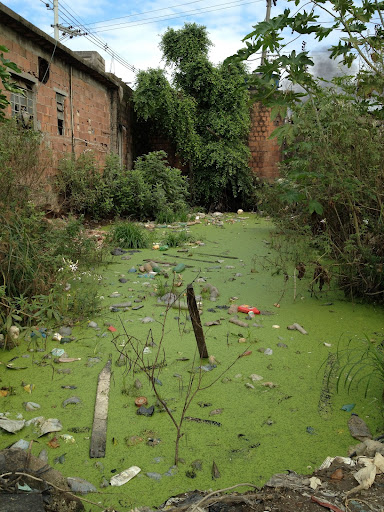Made world-famous by the artwork of Vic Muniz and the film Waste Land, this massive urban dump was, until recently, the last resort for honest employment for many poor Brazilians. Lacking municipal recycling pickup or facilities, nearly all of Rio's garbage was dumped in astonishing quantities in Jardim Gramacho -- food waste, glass, plastic, metals, books, and every crazy random thing one can imagine. The trash picker's, called catadores were then forced to scramble over piles of trash, risking constant injury and putrid conditions to recover huge quantities of valuable materials carelessly discarded. This situation was toxic for the trash pickers and the environment alike. The water, land, and air around the dump received a cocktail of toxins and waste spilled out, or was burned, around the dump.

As part of our work at the UN Conference on Sustainable Development (Rio+20), I joined a few members of the NRDC team for a visit to Jardim Gramacho and an inspirational meeting with the inspirational leader Ti?o dos Santos, president of the Association of Waste Pickers of Jardim Gramacho. There, we saw in living color how closely the health of humans and the environment are tied together. Poorly planned dumps like Jardim Gramacho are among the many sources of vast quantities of waste, especially plastics used for packaging, that end up as pollution on every coast, and in every ocean, river and lake on Earth. Waste also flows directly from city streets where it is improperly discarded -- out into the ocean through storm drains.
Fortunately, there are exciting efforts underway to change this whole system for the better, and Ti?o is among those leading the sea change. He and his colleagues were featured in the award-winning film Waste Land, and the funds from the sale of Muniz's artwork have allowed the pickers to formalize and negotiate for more rights. With the closing of Jardim Gramacho -- it was closed because of the tremendous environmental damage it causes from the leaching of toxins into the soil and sea water -- Ti?o has moved on to a wider campaign to educate the public about the impact of carelessly using and discarding trash.
Public education is important, but it also must be paired with facilities that can accept recyclable materials; and ultimately, we need to put an end to the careless use and discarding of these materials.
NRDC is working at Rio+20, and beyond, to advance systemic solutions to the problem of plastic waste in the marine environment. To do this, we have created a Global Call and Commitment to Stop Plastic Pollution. This website showcases governments, businesses, and organizations that are helping to stop pollution at it's source.
We need manufacturers and producers that use vast quantities of cheap plastic to deliver goods to market to bear more responsibility for the impacts of their products, especially the plastic packaging it comes in. Cities have trouble paying for recycling, and in much of the world, there simply isn't recycling, or even basic trash pick-up. This systemic change is known as extended producer responsibility.
Here at the Rio+20 summit, and beyond, we are calling on governments, businesses, and organizations to commit to participating in extended producer responsibility and other waste reduction measures. With these steps, we can create a healthier environment for all.
This blog originally appeared in NRDC's Switchboard.
?
?
?
Follow Leila Monroe on Twitter: www.twitter.com/@saveoceans
"; var coords = [-5, -72]; // display fb-bubble FloatingPrompt.embed(this, html, undefined, 'top', {fp_intersects:1, timeout_remove:2000,ignore_arrow: true, width:236, add_xy:coords, class_name: 'clear-overlay'}); });portland trailblazers will kopelman casey anthony leann rimes dakota fanning casey anthony video diary joe johnson
No comments:
Post a Comment